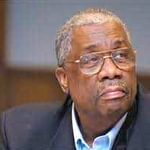Transcript
Anne Holsinger 0:01
Hello and welcome to Discussions with DPIC. I’m Anne Holsinger, Managing Director of the Death Penalty Information Center. Our guest today is Frank Thompson, a former superintendent of the Oregon State Penitentiary, and former Warden of Prisons for the Arkansas Department of Corrections with more than 20 years of experience as a correctional officer. He oversaw both of the executions performed in Oregon in the last 50 years, but has become an outspoken critic of capital punishment, writing op-eds and testifying in favor of repeal. Thank you for joining us, Mr. Thompson.
Frank Thompson 0:34
Certainly, thank you for having me.
Anne Holsinger 0:36
So first, can you tell us about what inspired you to become a corrections officer?
Frank Thompson 0:42
Well, while I was attempting to complete my graduate studies, I became employed as a police officer and a criminal investigator with the University of Arkansas in Fayetteville, and prior to that I had, I had three years of experience as a military policeman, which gave me better than six years of experience in law enforcement so so when it came time for me to get really serious about my career choices, law enforcement, seemed to have been a natural for me. That coupled with the fact that I had always felt comfortable with the idea of forming a career and criminal justice. So that’s, that’s how I, that’s how I matriculated toward becoming a superintendent in prisons.
Anne Holsinger 1:34
And as a corrections officer, you had much closer contact with death row prisoners than most people ever will. What did your work teach you about the people who are sentenced to death? Are they truly the worst of the worst?
Frank Thompson 1:46
Well, honestly, the answer to that question gets sort of lost, put attempting to apply a reliable definition of what type of adult on death row should be classified as being worst of the worst. And here are some reasons why the number of the adults on death row were convicted in a jurisdiction and a state that sentenced people to their throat, to death. Whereas another jurisdiction in that same state might very well sentence a person to a lesser crime calling for a custody classification, not like death row. Another reason is that the majority of adults on death row after having spent years in this capacity, they become model inmates. I know of a number of instances, for reasons other than abolition of the death penalty, there have been death row inmates who have been released to general population to life without the possibility of parole — and they have stellar records. When I was in Arkansas, we had the classification that Arkansas at the time — were house boys — where inmates were assigned to perform domestic duties for the warden, or for different staff. All of those were lifers, and many of whom some of whom have been on death row., so they become ideal inmates. They have the possibility of becoming model inmates. There’s another percentage of inmates on any death row — I’m not really prepared to give you the exact percentage, but this is percentages are significant — who are just simply mentally incompetent, or who were mentally compromised at the time that they committed the crime. And so when you combine these different elements of the profile of inmates on death row, it becomes difficult to come up with a worst of the worst type of inmates. Now I know the public, quite reasonably, has conjured up in their minds, but the worst of the worst is and it has to do with the crime committed as a lay person, public citizen, I can understand that. But being involved in corrections at the level that I’ve been over 20 years, at least, and and administering prisons, I’ve been able to see below the surface of that type of classification. So it’s not that easy to come up with a singular profile of what the worst of the worst might be.
Anne Holsinger 4:58
Sure, that makes a lot of sense. You also oversaw the last two executions carried out in Oregon. What were your responsibilities during those executions? What was your job like in the days leading up to them and on the day of the execution itself?
Frank Thompson 5:13
I led a team of people in developing a capital punishment protocol from scratch in the state of Oregon. When I received the death warrant for the first execution and began preparing, I realized that the state had not kept up or stayed current with the applicable execution laws. The existing law called for death by lethal injection — Oregon’s execution protocols were still for death by the gas chamber, so I really had to start from scratch, and train an entire complement of staff persons to pull off an execution with dignity. I really can’t explain the pressures our team felt in developing protocols for the first execution in 32 years. There were tasks associated with training the governor’s office on their roles, recruiting and training a complete complement of staff to conduct the execution, building and equipping the execution chamber, coordination of execution related responsibilities with the Justice Department, local law enforcement agencies, the media and the general public, from a public relations point of view. And all of this and more was being accomplished for the first time in over 32 years. And every time I’ve been asked that question, I’m personally awed at how much pressure we really went through. We just buckled down and took the task on step by step. And it was really a trying experience. In the days leading up to the execution, we were totally consumed with getting everything accomplished correctly. There were constant meetings, as I said earlier with the Justice Department and working with the governor’s office to train them on their roles in pulling off a good execution program.
Anne Holsinger 7:38
You said that you were actually responsible for creating the execution protocol and you’ve also written powerfully about the toll that executions take on the people who participate in them. How did creating that protocol and carrying out those executions affect you and your colleagues?
Frank Thompson 8:00
There were repercussions, impacts from the Governor’s level all the way down to line staff level. Kitzhaber is unashamed to talk about how he’s been affected. The director, David Cook, has gone public about how being involved in executions has affected him. His Assistant Airector Ben de Haan has talked, coordinately, about his reactions and his feelings and being involved in execution. Our Public Relations Officer Miss Perrin Naima, she resigned her position to accept another state job in order to avoid being involved in executions, again. My involvement and of having to lead efforts to build an execution program from scratch, recruiting and training a complete complement of staff to conduct execution, building and equipping the execution chamber, coordinating the execution related responsibilities with the Justice Department, local law enforcement and all of those related kinds of duties fell upon my shoulders to lead a team of professionals to accomplish. We were totally consumed with getting everything accomplished correctly. These were the first executions like I said in over 32 years, this was a made public but it was a powerful pressure on me personally, which I didn’t talk very much about. But I was the first minority, black superintendent of the Oregon State Penitentiary, the largest and the most violent, with a maximum security unit — prison in the state has the greatest population. And can you imagine? With all of the circumstances in the news surrounding botched execution we’ve recently had, can you imagine? What would have been the reaction, news wise or public wise? Had we botched the execution. So those kinds of things are looming in my mind all during the process of personally overseeing all of the tentacles of pulling off of these executions. And I have to apologize for using the word I because I had a team of consulate, consummate professionals working with me, but the law at the time started out by saying regarding pulling off execution, the Oregon State Penitentiary Superintendent shall blah, blah, blah, blah, blah. So that verbiage put the whole program on my shoulders. So leading up to conducting the first execution, those were just some of the pressures that you know that I faced.
Anne Holsinger 11:31
And how did your experiences working in corrections and working on those executions influence your views on capital punishment? How have those views evolved over the course of your career?
Frank Thompson 11:42
Well, I became intensely involved in the middle of struggle process that created additional group of victims, those who played roles and making an execution happen. It wasn’t very long after I started the process, that it became apparent that that’s what I was doing. From a sound public policy point of view, this victimization does not justify administering a process that does not make the general public safer, especially when there exist reasonable alternatives such as life without the possibility of parole. That impacted me quite a bit, it was powerful it was — you have to understand that I’m also a family member of a victim to murder and I relate very strongly to the feelings of many victims about getting rid of the death penalty. And I came to realize that I was creating an additional group of victims and training them to perform an execution. You see if when I came to the Oregon State Penitentiary, I supported the death penalty and if the protocols had been in place when I got there, I would have called the team together and ask them, okay, let’s get the protocols out, let’s brush the dust off of them and let’s get the program going and I probably could have done 2,3,4,5, 6 before it really ever bothered me. But this intense level of dealing with pulling off witnessing some of the stress among the staff really gave me pause to rethink what I was involved in. And I can’t necessarily point to a day and time of what instance in time it was, but that was a, incremental progression toward taking a position against the death penalty.
Anne Holsinger 14:20
Last December, in 2022, Governor Kate Brown commuted all of Oregon’s death row, changing the sentences of the state’s 17 death for prisoners to life without parole. At that time you put out a statement expressing your gratitude and support for the action. I’m going to quote a short section of your statement back to you: “The death penalty is simply a bad public policy on many levels. It does a disservice to everyone it touches including the state workers in our corrections department whose job it is to carry out executions. No employee of the state should have to take on the burdens that come with killing a defenseless human being.” So you say there that the death penalty is bad public policy on many levels. What are your reasons for saying that? And do you think that the death penalty system is capable of repair? Or would it be better if it were completely dismantled?
Frank Thompson 15:10
Let me give you at least five levels or situations related to the death penalty, there are more but the most practical level of the death penalty that gets an increasing amount of attention from legislate tours are the costs. The death penalty is prohibitively costly, with all of the appeals, that each death sentence is legally guaranteed to be made available to the person under the death sentence. Another level of concern against the death penalty is we’ve been at this program of executing people for many, many, many years and the debate about whether or not it really accomplishes anything still rages on. There is some progress to getting rid of the death penalty nationally, but the debate still goes on as to whether or not it is an effective deterrent. I am a total advocate for the position that it is not a deterrent. Another level is that the death penalty in all probability kills innocent people and all the reason I use the word probability is dead people can’t talk, but there are many, many individuals that have been released from death row because they have been determined upon review of their cases, to have been innocent of the crime and the charges as placed against them. Another level of concern about the death penalty is poor people, minorities, and mentally ill people are disproportionately represented on death row. And to some extent, that is a miscarriage of justice having constitutional implications, as far as I’m concerned. So those are just five and I don’t think we really need many more. Those are enough in my opinion, to wipe the death penalty is off of the books at every state in the country.
Anne Holsinger 18:01
Your statement also mentioned that you oversaw the construction of Oregon’s death chamber during your time as Superintendent of Prisons there, and that you would like to be present to witness its dismantling. What does the death chamber represent to you and why would it be meaningful for you to be present when it’s dismantled?
Frank Thompson 18:19
In my opinion, the death chamber is a relic of the past. It’s a reminder of a well-intended social reaction to dealing with crime that is outdated, and it serves no purpose, as public servants we’re expected to call shots based on evidence gleaned from the positions that we elected to and appointed to. There are times when elected officials will act in ways to awaken the public consciousness to an evolved reality. This is what Governor Kitzhaber, Governor Kate Brown, former director of corrections, and the recently elected Governor of Oregon have combined powers when they were elected to their positions to do by continuing the moratorium. The death penalty hasn’t been exercised in Oregon in over 50 years now — it’s archaic. It’s like many states in the South have come to the consciousness to remove statues representing antebellum politics in the south, representing an era that promoted slavery. They’ve taken those relics down and I see the death penalty in very much the same light. I helped to construct this relic of the past and my fingerprints all over this machinery of death, if you will, and I think it only appropriate to have me present to help destroy it or to help get rid of it and move it on into the past as an unfortunate chapter in our criminal justice system.
Anne Holsinger 20:21
What do you think of the actions taken by Governor Brown? Do you believe that other governors should take similar action?
Frank Thompson 20:28
I totally support such a bold and courageous move towards abolition of the death penalty, because it didn’t abolish it, but it kept the debate in the center of the table and then removed all of the inmates who were sentenced to death off of their throat. This was a courageous act and I think it should be replicated throughout the country where the death penalty is still on the books.
Anne Holsinger 21:00
Is there anything else that you’d like to share with our listeners?
Frank Thompson 21:04
Yes. Oftentimes, my position on capital punishment is criticized because it appears that I’m insensitive to the concerns of victims of the crimes that the people on death row have committed. I’m, like I said earlier, I’m a family member of a victim of murder and I, and because of that, I became more supportive of the death penalty than I had ever been before, for a period of time, prior to my abolition years, so I’ve experienced exactly what victims of murder are experiencing. So as an abolition of capital punishment, I’ve come to believe that it’s better to reduce the total number of victims by abolishing the death penalty, while better involving the victims that are of record. By engaging them more in the decision making process, when it comes to commutations, I believe victim services should continue to improve awarding aid and resources and financial assistance to victims where the needs are demonstrated. That probably is the issue that bothers me most and continuing to advocate for abolition of the death penalty. It’s difficult for me to respond to a victim when they say, I lost my lifelong partner, they have a right. They have a voice there, they live in a democracy, they have a right for those feelings, but they are expressing an individual sentiment and emotional feeling. I have the advantage of having been a public administrator, where my charge is to promote laws and processes that address the public safety needs of the public at large. And that’s where the distinction is. And I just hope that message can grow to be more appreciated as we continue to work toward abolition of the death penalty.
Anne Holsinger 23:48
Thank you so much for joining us today and for sharing your perspective on this issue. For our listeners, to learn more about the death penalty, you can visit the DPIC website at deathpenaltyinfo.org. And to make sure you never miss an episode of this podcast, you can subscribe to Discussions with DPIC on your podcast app of choice.




